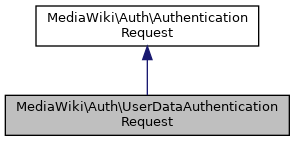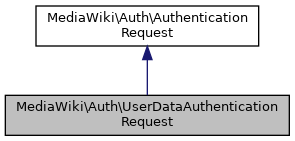This represents additional user data requested on the account creation form. More...


Public Member Functions | |
| getFieldInfo () | |
| Fetch input field info. More... | |
| populateUser ( $user) | |
| Add data to the User object. More... | |
 Public Member Functions inherited from MediaWiki\Auth\AuthenticationRequest Public Member Functions inherited from MediaWiki\Auth\AuthenticationRequest | |
| describeCredentials () | |
| Describe the credentials represented by this request. More... | |
| getMetadata () | |
| Returns metadata about this request. More... | |
| getUniqueId () | |
| Supply a unique key for deduplication. More... | |
| loadFromSubmission (array $data) | |
| Initialize form submitted form data. More... | |
Public Attributes | |
| string null | |
| Email address. More... | |
| string null | $realname |
| Real name. More... | |
 Public Attributes inherited from MediaWiki\Auth\AuthenticationRequest Public Attributes inherited from MediaWiki\Auth\AuthenticationRequest | |
| string null | $action = null |
| The AuthManager::ACTION_* constant this request was created to be used for. More... | |
| int | $required = self::REQUIRED |
| For login, continue, and link actions, one of self::OPTIONAL, self::REQUIRED, or self::PRIMARY_REQUIRED. More... | |
| string null | $returnToUrl = null |
| Return-to URL, in case of redirect. More... | |
| string null | $username = null |
| Username. More... | |
| const | OPTIONAL = 0 |
| Indicates that the request is not required for authentication to proceed. More... | |
| const | PRIMARY_REQUIRED = 2 |
| Indicates that the request is required by a primary authentication provider. More... | |
| const | REQUIRED = 1 |
| Indicates that the request is required for authentication to proceed. More... | |
Additional Inherited Members | |
 Static Public Member Functions inherited from MediaWiki\Auth\AuthenticationRequest Static Public Member Functions inherited from MediaWiki\Auth\AuthenticationRequest | |
| static | __set_state ( $data) |
| Implementing this mainly for use from the unit tests. More... | |
| static | getRequestByClass (array $reqs, $class, $allowSubclasses=false) |
| Select a request by class name. More... | |
| static | getUsernameFromRequests (array $reqs) |
| Get the username from the set of requests. More... | |
| static | loadRequestsFromSubmission (array $reqs, array $data) |
| Update a set of requests with form submit data, discarding ones that fail. More... | |
| static | mergeFieldInfo (array $reqs) |
| Merge the output of multiple AuthenticationRequest::getFieldInfo() calls. More... | |
Detailed Description
This represents additional user data requested on the account creation form.
- Since
- 1.27
Definition at line 34 of file UserDataAuthenticationRequest.php.
Member Function Documentation
◆ getFieldInfo()
| MediaWiki\Auth\UserDataAuthenticationRequest::getFieldInfo | ( | ) |
Fetch input field info.
The field info is an associative array mapping field names to info arrays. The info arrays have the following keys:
- type: (string) Type of input. Types and equivalent HTML widgets are:
- string: <input type="text">
- password: <input type="password">
- select: <select>
- checkbox: <input type="checkbox">
- multiselect: More a grid of checkboxes than <select multi>="">
- button: <input type="submit"> (uses 'label' as button text)
- hidden: Not visible to the user, but needs to be preserved for the next request
- null: No widget, just display the 'label' message.
- options: (array) Maps option values to Messages for the 'select' and 'multiselect' types.
- value: (string) Value (for 'null' and 'hidden') or default value (for other types).
- label: (Message) Text suitable for a label in an HTML form
- help: (Message) Text suitable as a description of what the field is
- optional: (bool) If set and truthy, the field may be left empty
- sensitive: (bool) If set and truthy, the field is considered sensitive. Code using the request should avoid exposing the value of the field.
- skippable: (bool) If set and truthy, the client is free to hide this field from the user to streamline the workflow. If all fields are skippable (except possibly a single button), no user interaction is required at all.
All AuthenticationRequests are populated from the same data, so most of the time you'll want to prefix fields names with something unique to the extension/provider (although in some cases sharing the field with other requests is the right thing to do, e.g. for a 'password' field).
- Returns
- array As above -return array<string,array{type:string,options?:array,value?:string,label:Message,help:Message,optional?:bool,sensitive?:bool,skippable?:bool}>
Reimplemented from MediaWiki\Auth\AuthenticationRequest.
Definition at line 41 of file UserDataAuthenticationRequest.php.
References MediaWiki\$config, Config\get(), MediaWiki\MediaWikiServices\getInstance(), true, and wfMessage().
◆ populateUser()
| MediaWiki\Auth\UserDataAuthenticationRequest::populateUser | ( | $user | ) |
Add data to the User object.
- Parameters
-
User $user User being created (not added to the database yet). This may become a "UserValue" in the future, or User may be refactored into such.
- Returns
- StatusValue
Definition at line 76 of file UserDataAuthenticationRequest.php.
References StatusValue\newFatal(), and StatusValue\newGood().
Member Data Documentation
| string null MediaWiki\Auth\UserDataAuthenticationRequest::$email |
Email address.
Definition at line 36 of file UserDataAuthenticationRequest.php.
◆ $realname
| string null MediaWiki\Auth\UserDataAuthenticationRequest::$realname |
Real name.
Definition at line 39 of file UserDataAuthenticationRequest.php.
The documentation for this class was generated from the following file:
- includes/auth/UserDataAuthenticationRequest.php
